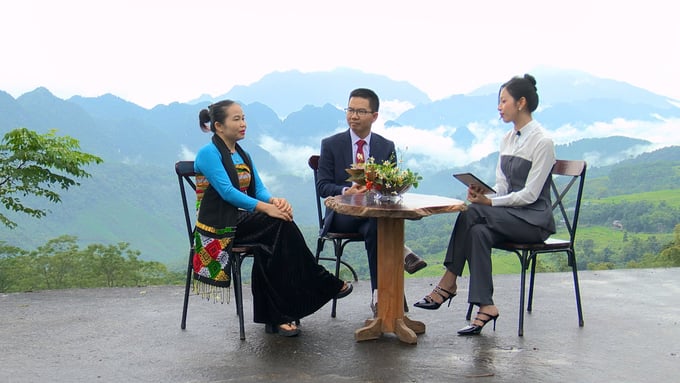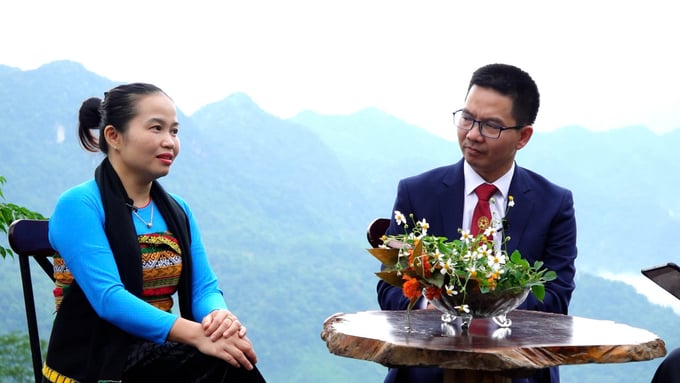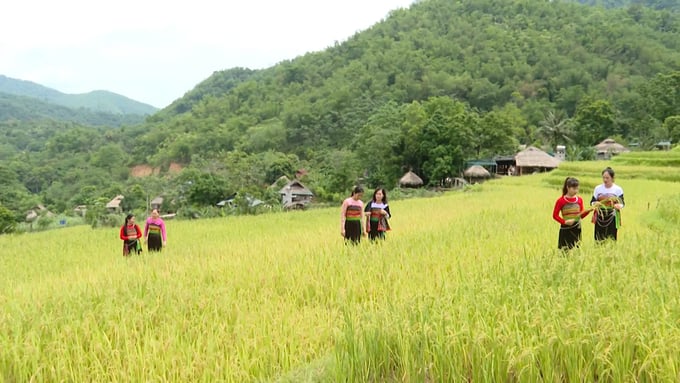December 2, 2025 | 21:03 GMT +7
December 2, 2025 | 21:03 GMT +7
Hotline: 0913.378.918
December 2, 2025 | 21:03 GMT +7
Hotline: 0913.378.918

Talk "Farmers' knowledge unlocks agricultural and rural tourism". Photo: Pham Huy.
Rural and agricultural tourism is a policy and development orientation aimed at building an ecological agriculture, modern rural areas, and cultured farmers.
The Ministry of Agriculture and Rural Development has compiled reports from localities, showing that there are currently about 84 agricultural and rural tourism models in operation and included in local support plans. Additionally, the Ministry has approved a list of 20 pilot models for agricultural and rural tourism to be implemented by 2025.
The number of businesses and visitors participating in agricultural and rural activities is steadily increasing. Agricultural and rural tourism models involving the direct participation of local residents have enriched and enhanced the appeal of tourism products, while also providing higher income for farmers. This has become a method for poverty reduction, promoting sustainable and effective development in disadvantaged communities and rural areas across the country.
However, practical experience from various localities shows that there are still many bottlenecks and barriers that require collaborative solutions. Among these, farmers' knowledge is identified as an important solution to enhance the capacity of farmers in developing agricultural and rural tourism.
At the recent roundtable discussion "Farmers' knowledge unlocks agricultural and rural tourism" organized by Vietnam Agriculture Newspaper, Mrs. Lo Thi Hoai from the community tourism group in Kho Muong village (Thanh Son commune, Ba Thuoc district, Thanh Hoa province) shared: From the reality in Pu Luong, agricultural and rural tourism has contributed to transforming the rural landscape in the mountainous areas of Thanh Hoa province, especially among the Thai community in Pu Luong. In the past, local livelihoods faced many difficulties, with outdated mindsets. Every household raised cattle and poultry right under their stilt houses, leading to environmental pollution, and agricultural products were mainly for subsistence. Thanks to the development of community tourism and agricultural and rural tourism models in recent years, many families have become prosperous, and people in various communities have learned to collaborate to form cooperatives that promote tourism linked to the region's landscape and cultural identity.

Mrs. Lo Thi Hoai (left) - Community tourism group of Kho Muong Village. Photo: Pham Huy.
"The locals teach each other to cultivate rice in staggered seasons on the terraced fields to attract more visitors to Pu Luong and encourage them to stay longer. They know how to tell the stories of local products, such as the Co Lung ducks, Pu Luong snails, Thanh Son hill chickens, and Pu Luong bamboo shoots. They revive the cultural identity of their community through traditional costumes, songs, and festivals. They build routes connecting landmarks for tourists to explore Pu Luong, create homestays and farm stays, and learn foreign languages for tourism... This means that through tourism development, the locals have turned what seemed worthless into valuable assets, providing them with stable income and ongoing growth", said the leader of the community tourism group in Kho Muong village.
Analyzing the practical challenges the locals face regarding issues of collaboration, the establishment of cooperatives, land policies, and credit support policies, Mrs. Hoai believes that to develop sustainable agricultural and rural tourism, the community needs to leverage the value of local resources such as natural landscapes, cultural identities, and local products like Co Lung ducks, Hoi mandarins, Pu Luong snails, and forest bamboo shoots to serve tourists.
However, a current challenge is the limited funding and promotional activities for product introduction. Therefore, for agricultural and rural tourism to develop sustainably, the supportive role of the government is crucial, particularly through consistent policies that extend from the central level to localities.
Sharing the same view as Mrs. Lo Thi Hoai, Dr. Hoang Sy Thinh (Faculty of Tourism and Foreign Languages, Vietnam National University of Agriculture) also affirmed: First and foremost, farmers' knowledge and local values are the unique 'specialties' of agricultural and rural tourism, as well as community tourism. Evidence from various localities shows that effective development models arise when communities effectively tap into their strengths. These strengths include traditional cultural values, agricultural production practices, local specialties, breathtaking natural landscapes, vibrant festivals, traditional crafts, and authentic culinary experiences. By harnessing these elements, communities can create tourism products that are not only distinctive but also specialized, offering visitors a rich and immersive experience.

Community tourism in Pu Luong. Photo: Pham Huy.
Consequently, in order for agricultural and rural tourism to successfully navigate the existing barriers, it is essential to implement comprehensive solutions aimed at refining policies. This is particularly important for policies that provide support to localities in developing pilot models. In addition, it is necessary to focus on creating a diverse and high-quality network of agricultural and rural tourism destinations, featuring products that showcase the unique characteristics of various regions. It is crucial to leverage the outstanding advantages of rural areas, including their agricultural potential, ecological landscapes and rich traditional cultures.
Alongside supportive policies, it is crucial to establish a comprehensive legal framework and provide detailed guidelines to enable localities and residents to effectively develop agricultural and rural tourism. Additionally, training solutions and developing diverse array of tourism products that capitalize on the interconnectedness of tourism and agriculture value chains. This strategy will enhance the variety of experiences offered and ensuring high quality to meet the expectations of both domestic and international tourists. It also includes the creation of well-designed tours and routes that guide visitors into rural areas. Moreover, many localities and residents participating in tourism have increasingly adopted technology and utilized social media platforms to effectively promote and advertise rural tourism.
"The reality is that the development of agricultural and rural tourism in recent times has not fully utilized the available potential. One reason for this is the lack of coherent policies, which has resulted in agricultural and rural tourism products remaining fragmented. This is an issue that needs to be addressed in the near future", Dr. Hoang Sy Thinh analyzed.
Translated by Phuong Linh

(VAN) Con Dao National Park officially received its Green List status after it was announced at the IUCN World Conservation Congress in Abu Dhabi in October.

(VAN) The National Assembly’s inspection delegation called for a renewed approach to marine economic development, the removal of legal 'bottlenecks,' and strengthened marine environmental protection.

(VAN) The inevitable path forward is to reorganize production along the value chain, utilizing cooperatives as the core, enterprises as the driving force, and farmers as the central subjects.

(VAN) On November 28, Minister Tran Duc Thang, together with China's Minister of Agriculture and Rural Affairs Han Jun, chaired the 2nd meeting of the Viet Nam - China Agricultural Cooperation Committee.

(VAN) Forest carbon credits are only accepted when they ensure absolute environmental integrity, additionality, permanence, and transparency.

(VAN) Viet Nam partners with Beijing on controlling air pollution, cross-regional management, high-tech monitoring and relocating polluting facilities.

(VAN) With a USD 50 million investment, Australia is partnering with Viet Nam to operate its first public electric bus fleet and develop a nationwide EV charging network.